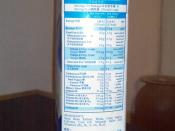Advantages and Disadvantages of milk.
The article written in the Sunday Times by Dr. Wolfe Segal, Senior lecturer in Biochemistry, University of W.A called 'Milk Is Full Of Food Value', discuses the facts about milk. Dr. Wolfe Segal wrote what vitamins and minerals are in milk also how many grams of fat, protein, and lactose are in milk. Dr. Wolfe Segal also wrote about what milk can do to the human body in good and bad ways. Dr. Wolfe Segal gave good information on the advantages and disadvantages of milk.
The advantages of milk are that milk contains lots of vitamins, minerals, fats, proteins, and lactose. All these nutrients are part of a balanced diet and therefore are very healthy for the human body. Milk is mostly composed of water, which is also very healthy for the human body. The human body needs all of these nutrients to function properly.
Milk contains vitamins A, B1, B2, B5, B6, B12 and vitamin C. Vitamin B1 and niacin help the body produce energy in its cells, among other things. Vitamin B6 helps the body fight illness and infection, while B12 is used to develop red blood cells. Vitamin B2 (Riboflavin) helps the mitochondria (fat-burning furnaces) of muscle cells to produce energy. B5 makes brain neurotransmitters and natural body steroid hormones. The right amount of B Vitamins in their diet helps protect children from slowed growth, anaemia, eye troubles, nerve damage, and heart problems. Vitamin A provides your first line of defence against invading toxins since it establishes healthy skin and mucous membranes. All these vitamins give milk a great advantage to be healthy for all ages. The Minerals that are found in milk are Calcium, Phosphorus, Sodium, Potassium and small amounts of iron. Calcium is needed in a humans diet for all...


